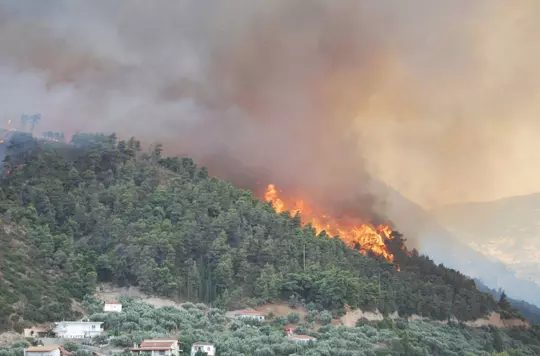11 August 2023
Growing opportunities across the territory
George Tanton

As part of National Allotments Week (7 to 13 August), George Tanton explores how Salvationists are unearthing the potential of green spaces.
It is written in Proverbs 28:19: ‘Those who work their land will have abundant food.’ Indeed, this is part of the motivation of many people who have allotments across the country. Sustainable living, the impact of international food shortages and an awareness of caring for God’s creation have led to a growing demand for community allotments – a trend not seen since the Second World War.
People are also re-evaluating their carbon footprint, including considering how their food is produced and transported.
‘We need to eat seasonal and eat local to avoid carbon emissions,’ says Territorial Environmental Officer Major Heather Poxon. ‘In many indigenous societies around the world, there are traditions of protecting the forest and respecting the rhythm and gifts of the seasons.’
The Salvation Army’s international positional statement on caring for the environment recognises that ‘the very survival of humanity depends on the health of the whole ecosystem’. Learning about the natural world is one aspect of caring for it.
At George Williams Lifehouse, a gardening club in partnership with Fleetwood Town Football Club’s Community Trust is encouraging people to grow and nourish the centre garden. Service Manager Danielle Jones explains that young people particularly enjoy taking ‘responsibility to regularly water, weed, and take care of the plants and vegetables’.
Similarly, children at Deptford Corps have benefited from caring for creation in the hall garden. Corps officer Lieutenant Lesley Holland explains: ‘Our toddler group love being outside in the garden, and have benefited from growing sunflower seeds, some for taking home and some which are now growing in the garden.’
At Sale Corps, the community garden is used by the Toddlers Stay and Play sessions to teach about caring for creation.
‘The children visit their “Tots Plots” to water and tend to the flowers and strawberries that they are growing there,’ explains corps officer Major Ann Montgomery. ‘We also use water butts to collect rainwater for watering the plants and have compost facilities too.’
At Watford Corps, teaching younger generations about caring for creation has become a pillar of its ministry. Every week from spring to autumn, the corps community allotment – a recognised RHS Five Star School Garden – is visited by up to 120 pupils, who enjoy growing food and flowers.
Reducing reliance on imported foods is another benefit of community allotments. ‘Cultivating, caring and co-operating to grow vegetables by interacting with nature together can be an eye-opener to many who are cut off from these organic processes under big-supermarket driven mass production systems,’ says St Albans corps officer Captain Wan Gi Lee. ‘Allotments raise awareness of the importance of growing vegetables and plants to tackle the issue of sustainable food supplies locally.’
At Deptford Corps, the Inside Out club is ambitious at sustainably producing its own homegrown food.
‘We have several raised beds where we grow fruit and veg,’ explains Lesley. ‘Families in our congregation are currently growing vegetables that will be used in corps barbecues.’
At the shared community allotment at Oldbury, corps members harvested one of God’s sweetest provisions – honey! The onsite caretaker’s cottage had a crumbling chimney and, once restoration work had begun, a beehive was revealed (pictured right). The honey was then sold in the corps community café.
Forest of Dean Corps has several food sustainability initiatives under way. Operating out of a refurbished pub, the outreach centre has a greenhouse and vegetable plot in the old pub garden, which is used by the community to grow and harvest their own produce.
Furthermore, the corps gardening club, Grow ‘n’ Sow, works in co-operation with the Plot to Pot luncheon club: one group grows the produce and the other prepares it for meals. The corps also provides agricultural space for the community to use. Excess produce is used to supplement food parcels.

Jersey Corps uses its allotment to provide a space for people with learning difficulties. In partnership with the government’s health department, they provide weekly gardening sessions.
‘They get to choose what they grow and nurture,’ explains corps officer Captain Richard Nunn. ‘Instead of being cared for, they get to care for something.’
They take some of the produce home, some is sold in the corps honesty box and some goes into the soup that the corps makes and gives away in the town.
Southport Corps has redeveloped disused land at the back of its hall to create a community garden, which includes a fruit and veg growing area with produce donated to a local food bank. There are plans to expand these spaces.
‘This will enable us to provide more fresh produce to the local community,’ explains Community Programme and Engagement Manager Kathryn Casserley. ‘With it being grown on our doorstep, we contribute to reducing our carbon footprint, which is more sustainable and better for the environment.’
While the idea of community allotments can sound quaint, food sustainability is a serious issue.
‘There will come a time when communities in the UK will have no option but to be resilient to food scarcity,’ warns Heather. ‘We hear of soaring temperatures and wildfires in Europe and America. With the guarantee of more to come, the production of the crops we rely on becomes more challenging.
‘High temperatures and lack of rainfall impact seedling growth. As our imported food becomes scarcer, prices rise and societal tensions in the source countries increase. As people struggle to survive, we will see greater civil unrest and an increase in climate migrants as populations migrate north to cooler climes.
‘Will we be ready to receive our neighbours? Will we be resilient and learn to rely on our own resources?’
Written by

George Tanton
Editorial Assistant
Discover more

As wildfires spread on the Continent, Major Heather Poxon reflects on the urgency of the climate crisis.

Major Heather Poxon talks to Simon Hope about the Army’s goal to halve its carbon footprint by 2030.

In this Environment Sunday special, Major Phil Howe encourages us to tread softly and care for God’s creation.

Supporting the territory to care for creation and tread softly on our common home.